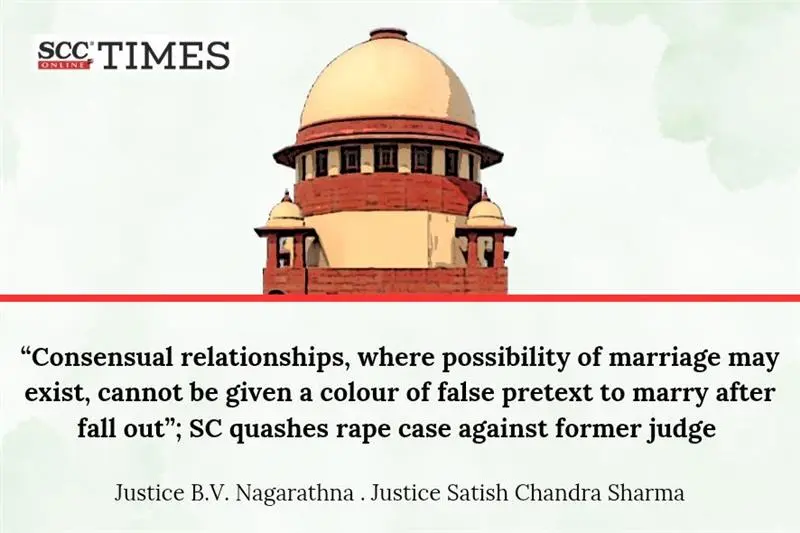Supreme Court: In a criminal appeal filed by the accused against the order passed by the Calcutta High Court, wherein the Court refused to discharge the accused charged under Sections 376, 417 and 506 of the Penal Code, 1860 (‘IPC’), the division bench of BV Nagarathna and Satish Chandra Sharma*, JJ. said that there is a growing tendency of resorting to initiation of criminal proceedings when relationships turn sour. Every consensual relationship, where a possibility of marriage may exist, cannot be given a colour of a false pretext to marry, in the event of fallout. It is such lis that amounts to an abuse of process of law. Thus, the Court set aside the impugned order and terminated the proceedings as the physical relationship between the complainant and the accused was consensual.
Background
The accused was a former judicial officer who had superannuated from the post of Civil Judge (Senior Division), City Civil Court, Calcutta. The FIR had been registered at the behest of the complainant, who alleged that in 2014, during the pendency of the litigation arising from marital discord with her ex-husband, she had met the accused, who was then posted as ACJM. The complainant claimed that the accused, also separated from his wife, assured her that he would marry her and take full responsibility for her and her son from the first marriage, once she was divorced. The accused allegedly kept the complainant in a rented house, got her son admitted to a school at his expense, and regularly transferred money into her bank account for her and her son’s daily expenses. On this pretext, the accused allegedly had physical relations with the complainant on multiple occasions. The complainant also stated that the accused took her to his residence in Kolkata and repeatedly assured her of marriage. However, once the complainant’s divorce was finalized, the accused started avoiding her, stopped answering her calls, and told her not to contact him.
In her statement under Section 164 of the Code of Criminal Procedure, 1973 (‘CrPC’), the complainant reiterated these allegations and further deposed that it was at the accused’s insistence that she handed over the cases against her husband to an Advocate, who charged no fees. The complainant claimed that after her divorce, the accused stopped receiving her calls and instructed his security guard to prevent her from making any further calls, threatening harm to her son if she did. The complainant stated that she had been mentally and physically exploited by the accused.
During the investigation, the accused was granted anticipatory bail by the Calcutta High Court. The investigation was transferred to the Criminal Investigation Department (‘CID’), West Bengal, which culminated in a chargesheet against the accused and the advocate. The magistrate took cognizance of the chargesheet on 01-05-2020, which the accused challenged in revision. On 20-11-2020, the High Court directed the accused to seek appropriate remedies once the case was committed to the Sessions Court. The revision petition was ultimately dismissed on 21-11-2022 by the High Court, which observed that there was substance in the allegations and prima facie material to make out a cognizable offense against the accused.
The accused sought discharge via an application under Section 227 CrPC, which was dismissed on 04-01-2024 by the District & Sessions Judge. The accused subsequently challenged this order in revision before the High Court. The High Court dismissed this revision on 23-02-2024.
Issue
Whether the allegations against the accused, as they stand, constitute an offence, under Sections 376(2)(f), 417 and 506 IPC; and whether the case of the accused is fit for discharge under Section 227 CrPC, 1973.
Analysis and Decision
After perusing the FIR and the statement of the Complainant under Section 164 CrPC, the Court noted that the accused and the Complainant had come into contact in 2014, during the pendency of matrimonial disputes related to the Complainant’s marriage. According to the Complainant’s own account, the accused had informed her that he was separated from his wife. The Complainant, who was aware of both the personal and professional background of the accused and had been receiving financial assistance from him for herself and her son, must have carefully considered her decision before entering a relationship with the accused.
After taking note of Pramod Suryabhan Pawar v State of Maharashtra, (2019) 9 SCC 608, the Court further observed that even if the Complainant’s version was accepted at face value or considered that the relationship was based on the accused’s offer of marriage, the Complainant could not claim ‘misconception of fact’ or accuse the accused of ‘rape on the false pretext of marriage.’ From the very beginning, the Complainant was aware and conscious of the fact that the accused was in a subsisting marriage, albeit separated. Despite this knowledge, it was the Complainant’s own reasoned choice to enter and sustain a relationship with the accused, fully understanding the circumstances, actions, and consequences involved. The Complainant’s conduct, therefore, reflected a deliberate and thoughtful decision.
The Court further stated that even if the allegations in the FIR and chargesheet are accepted at face value, it seems highly improbable that the Complainant would have engaged in a physical relationship with the accused solely based on his assurance of marriage. As rightly noted by this Court in Prashant Bharti v State of NCT of Delhi, 2024 SCC Online SC 3375 it is inconceivable that the Complainant, or any woman for that matter, would continue to meet the accused or maintain a prolonged association or physical relationship with him in the absence of voluntary consent on her part. This suggests that the relationship, as described, was likely based on mutual understanding and consent, rather than coercion or deception.
The Court noted that in the case of Uday v State of Karnataka, (2003) 4 SCC 46, the Court had acquitted the accused on the basis that the complainant was a mature college student who had consented to sexual intercourse with the accused of her own free will.
After a careful review of the evidence presented, the Court concluded that there was no substantial evidence against the accused to establish any fraudulent or dishonest inducement to the Complainant that would constitute an offence under Section 415 of the IPC. While it could be argued that the accused was in a position of power to exert influence, there was no evidence on record to prove inducement or enticement. Additionally, there was no material evidence suggesting that the Complainant was threatened with injury or damage to her reputation, making the allegation of criminal intimidation under Section 506 of the IPC unsubstantiated.
Furthermore, the Court found inconsistencies in the statements made by the Complainant. In her statement under Section 164 of the CrPC, she had claimed that it was only upon the accused’s insistence that she handed over her cases to a particular advocate. However, the chargesheet revealed that the said advocate was already known to the Complainant as a senior from her college and had introduced her to the accused regarding her pending cases. This contradiction, though notable, did not provide sufficient grounds to dispute that the relationship between the accused and the Complainant was consensual.
The Court also noted a growing trend of initiating criminal proceedings when relationships turn sour. It emphasised that not every consensual relationship, particularly one involving the possibility of marriage, should be misconstrued as a case of false pretenses in the event of a fallout. Such instances, the Court remarked, amounted to an abuse of the legal process. In light of these considerations, the Court deemed it appropriate to terminate the proceedings at the charge stage.
Given that the incident occurred in 2014, the Court highlighted that continuing litigation would only prolong the suffering of both parties, who were now living separate lives. After considering the facts, the Court concluded that the physical relationship between the Complainant and the accused was consensual and could not be classified as occurring without her consent or against her will. Therefore, the Court set aside the impugned order of the High Court and allowed the appeal, thereby terminating the proceedings.
CASE DETAILS
|
Citation: Appellants : Respondents : |
Advocates who appeared in this case For Petitioner(s): For Respondent(s): |
CORAM :










